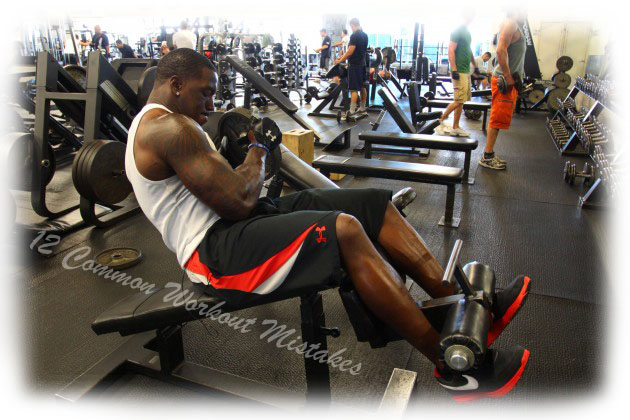How often have we seen people drop out of their gym enrolments within 6 months? The answer is Quite Often. They either do it because of lack of time or lack of results.
 As a regular gym-goer, there are several precautions that you must take in order to avoid getting injured and to see a positive result of all your hard work. As a beginner you need to first prepare your body for the strains that exercise will put on your body. Improper workout planning will only result in complete burn-out, fatigue and injury.
As a regular gym-goer, there are several precautions that you must take in order to avoid getting injured and to see a positive result of all your hard work. As a beginner you need to first prepare your body for the strains that exercise will put on your body. Improper workout planning will only result in complete burn-out, fatigue and injury.
Lets now have a look at the most common 12 workout mistakes:
1. SKIPPING THE WARM-UP
Before diving head first into a full blown exercise schedule, it is essential to put in a few minutes of warming up the body. This will help loosen up the body, bring the muscles upto speed and reduce the risk of injury during the actually training process. Some simple tips for an effective warm-up are gentle walking, spot jogging and cycling
2. Skipping The Cool-Down
It would be incorrect to rush into the showers soon after the beeper on the treadmill goes off ot after you have finished the final repetition of your weights. The heart needs some time to come back to its resting rate. This is possible only if you engage in some cooling down or warming down activities like a reducing the seed of your workout or reducing your speed on the treadmill.
3. NOT STRETCHING
Post the warm-up it also essential to stretch a little and make the muscles a little more flexible before diving into the training module. Regular stretching not only increases flexibility but also reduces the risk of injuries.
4. LIFTING TOO MUCH WEIGHT TOO FAST
The muscles will burn to if you decide to lift all the weight you can in the very first go or right in the beginning, It is essential to increase the weights slowly and gradually during the course of your workout. This will help muscles get used to the tension and the resistance and thus build up accordingly.
5. Not Increasing The Resistance
If you keep working with the same amount of weights with the same amount of repetition over a period of 2 months, then you are not testing the waters any further. You body will maintain the current state and will not be motivated to grow further or lose weight further. You need to increase the tension and resistance over a period of a few days.
6. Working Out Only On Weekends
Working out more than required on one particular day will do your body more harm than good. It will put unnecessary stress and strain on the muscles and will also lead to injuries. It is essential to take each day and its schedule as it comes when we speak of exercises.
7. Waiting Until You Are Thirsty To Drink
It is not a good practise to keep you thirsty during the course of the exercise session. It will only lead to dehydration and all your effort thus far will be wasted. It is essential to drink plenty of fluids before, during and after the workout session.
8. Resting Too Much In Between Exercises
Resting for too much time between the exercises will negate all the efforts put in thus far. It will also up the ante for injury. It is necessary to give your body some breathing space between 2 different exercises but this time may not exceed more than a minute.
9. Overdoing It
It is important to understand when to stop and call it a day. Over exercising will not give extra results. The muscles and the body need some time for further growth and the necessary wear and tear. In a given cardiovascular workout, exceeding the time limit of 60 minutes tends to have a negative effect on the heart and overall body and wellbeing. Hence it is necessary to understand the limitations of your body and give it its due respect.
10. Neglecting The Prescribed Diet
It would be an absolute waste of time, money and efforts to only concentrate o the exercise regimen and ignore the dietary chart prescribed along with it. Eating the right kind of food while undergoing weight training and weight loss program is as important as adhering to the exercise routine.
11. Using Incorrect Technique
Incorrect form and technique, especially during strength training program is certainly a way to land up with injuries, soreness and pain.
12. Setting Unrealistic Goals And Measuring Wrong Results
Knowing your abilities, level of commitment and your lifestyle will help you determine your goals and set them accordingly. After setting your goals correctly it is essential to measure your fitness progress appropriately and set further targets to be achieved.
It is extremely important to understand that exercise will manifest itself in mental well-being and vice versa.


 Cart : 0 items - $0.00
Cart : 0 items - $0.00










